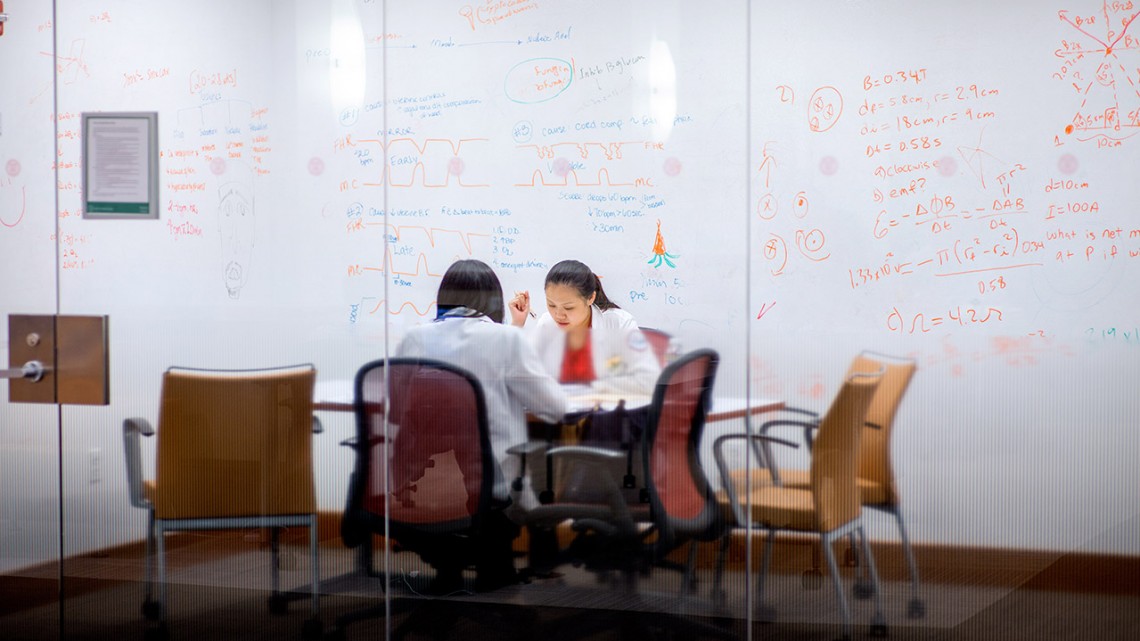
Innovation flourishes across Cornell’s campuses.
Innovation flourishes across Cornell’s campuses
By Joe Wilensky
Cornell’s New York City campuses also have embraced and encouraged new technology, directions and platforms to increase engagement and boost research and real-world connections.
M.D.-Ph.D. student Andrew Griswold has benefited from curricular innovations at Weill Cornell Medicine’s medical and graduate schools in the five years he’s been studying there. To him, the most meaningful reform has been getting M.D.-Ph.D. students to complete some clinical training prior to immersing themselves in laboratory research.
A memorable moment came in the second year of his medical studies, when his instructors on the cardiology floor encouraged the students to consider how to personalize care for each patient based on his or her mechanism of disease.
“There’s been a push to further integrate basic science education with clinical training so that you’re taught to both be able to follow protocols as medicine becomes more regimented, but also think in a mechanistic fashion so you’re equipped to tackle patients as individuals and see diseases as processes,” Griswold said. He noted that while he and his fellow students had multiple patients with heart failure, “each case was based on a different mechanism, and that determined our route of care for each patient. It’s a form of personalized medicine without necessarily genetic sequencing of everyone.”
Dr. Augustine M.K. Choi, the Stephen and Suzanne Weiss Dean and Cornell’s provost for medical affairs, said Weill Cornell Medicine is dedicated to ensuring that its medical and graduate school curricula reflect modern learning pedagogies to prepare today’s students for an ever-changing health care landscape.
A new curriculum, unveiled in 2014, exposes medical students to patient care beginning on their first day and integrates those clinical experiences with the scientific basis of disease. One new element, the Translational Science course, details how cutting-edge science has improved patient care – through lessons reinforced by patients who have benefited from those advances. The new curriculum also provides a dedicated six-month research block to complete the Areas of Concentration capstone program.
Griswold notes that personalization of medicine, and the challenge of making it broadly available, is an integral theme of student courses and research. He predicts more integration of technology into medical training, as well as increased use of machine learning in large medical datasets. “It will change how we think of disease and how we think of the way we treat patients,” he said.
Medical students are already increasingly using new technology to augment their education, from school-provided iPads that offer e-books and other interactive learning platforms to a digital module on multiple sclerosis developed in collaboration with eCornell and a simulation lab for the realistic practice of clinical skills.
At the Weill Cornell Graduate School of Medical Sciences, administrators are focusing on enhancing joint engagement between graduate and medical students and their programs, such as a pilot program this academic year that allows students to participate in select aspects of the medical school curriculum that are directly relevant to their research activities.
This work builds upon existing joint learning that can contextualize the clinical implications of graduate students’ fundamental research and inspire new lines of scientific inquiry.
Instrumental to these curricular and extracurricular activities will be the new Feil Family Student Center, which opens in October and will expand the institution’s dedicated student space by nearly 75 percent, creating new areas on campus for education, collaboration, wellness and student engagement.
The Cornell Tech graduate school campus on Roosevelt Island was conceptualized around and built on an intentional culture of creativity, collaboration and innovation. This is evident throughout the curriculum and programming, and is perhaps most immediately apparent in the school’s renowned Studio experience – where students in business, law, ethics, design, engineering, computer science, social sciences, health and other fields form teams and apply the advanced theoretical knowledge in technical and professional disciplines learned in their other courses to build digital solutions for real users.
The Studio curriculum encompasses two semesters: The first semester is Product Studio, in which teams of students develop a new tech product or service in response to specific challenges posed by companies; the second semester is either Startup Studio, where students develop a new startup from the ground up, or BigCo studio, where students apply their skills and innovate within an existing big company.
A speaker series, part of the Studio curriculum, features guest practitioners who are impacting society through their entrepreneurial efforts in provocative, closed-door discussions with students.
Media Contact
Get Cornell news delivered right to your inbox.
Subscribe

